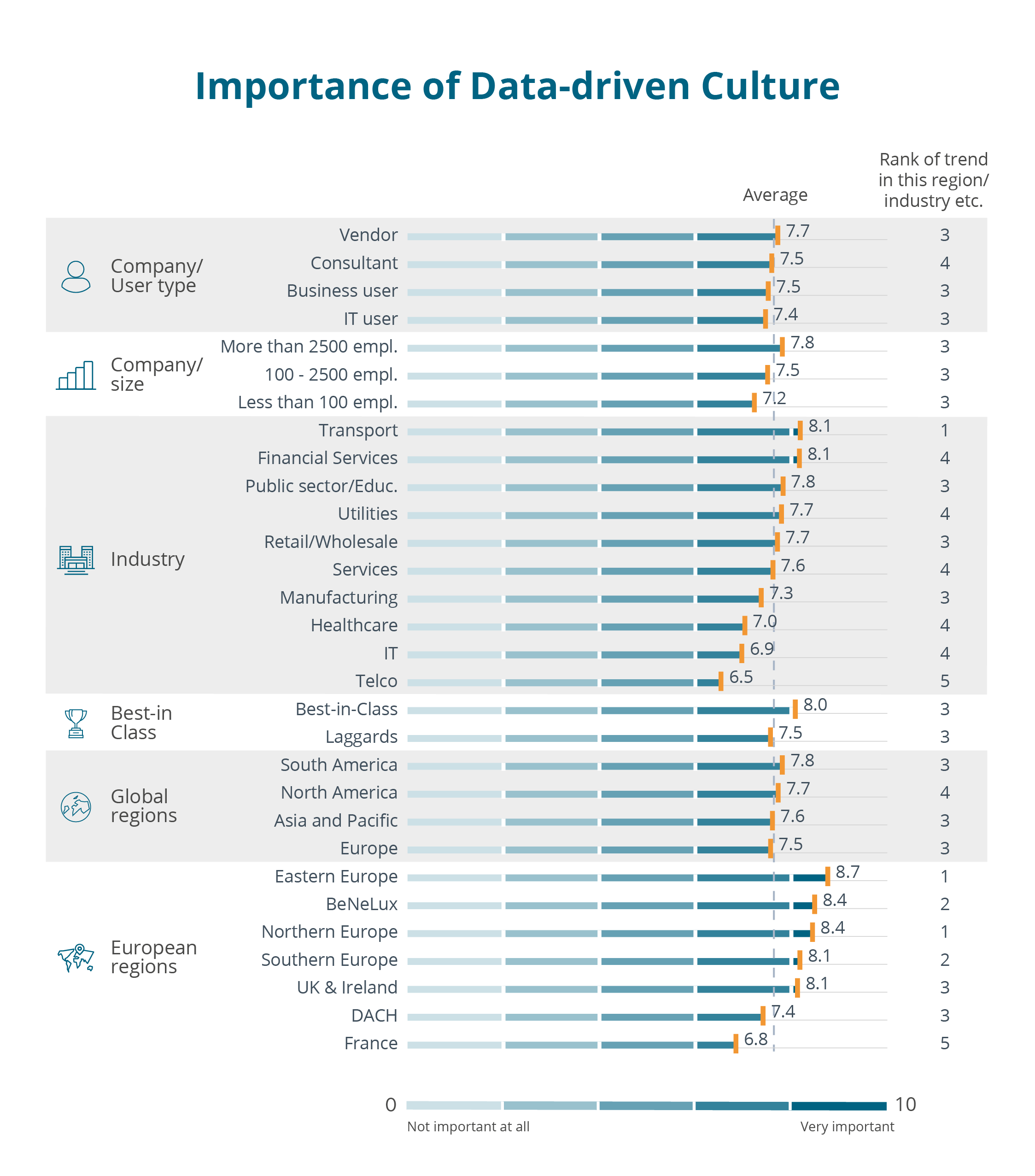Creating a Data-Driven Culture
Are you looking for further assistance on this topic? You will find it here.
Extracting insights out of data
The amount of data in all areas of life is growing rapidly. People and companies today are constantly generating volumes of data – the speed, variety, and complexity of information are also increasing. However, only those who know how to handle data effectively and use it purposefully can create real value.
One of the biggest shifts in today’s business world is the transformation from isolated, project-oriented data use to a broader adoption of analytics and insights enabled by a data-centric culture. But how can companies transition from being instinct-driven enterprises to organizations based on data and insights?
Definition: What is a data-driven culture?
A data-driven culture replaces gut feelings with decisions grounded in data-derived insights, encompassing key figures like revenue, results from advanced analytics, or qualitative information.
It treats data as a primary resource for leveraging insights across departments. While companies have always been interested in their numbers, a data-focused culture elevates the extent and sophistication of data use to a new level.
The main aim is to influence beliefs and behaviors by changing mindsets and empowering employees to actively use data in their daily work. This ensures decisions are more effective, initiatives are more impactful, and competitive advantages are amplified.
Data should move to the center of decision-making processes, operational improvements, and innovation. Achieving this requires collaboration among data engineers, scientists, business analysts, and employees using data in their respective fields. It also involves creating new use cases, discovering patterns in data, and experimenting with analytics solutions to see what really works in operational and strategic processes.
The preconditions for establishing a data-driven culture are data access, governance over data usage and quality, analytical methodologies, and suitable technologies for data transformation, storage, analysis, and sharing.
Why a data-driven culture matters
Most companies already derive insights from data. However, a data-driven culture is not about blindly following numbers. It emphasizes critical thinking, data interpretation skills, and improved communication of findings. This enables businesses to base decisions on reliable insights while also knowing when not to.
Major benefits of a data-driven culture include:
Promoting collaboration between different teams in the organization
Aside from the use of data, collaboration between different people and teams in the company is the second key factor why a data-driven culture is crucial. The deep insights gained through analytics and AI are the starting point. Those insights can help many members of the organization in their daily work and connect the ideas of different departments.
Fostering data democratization
This leads directly to the next point. A data-driven culture helps to eliminate gatekeepers that create a bottleneck at the gateway to the data. In most organizations, the IT department acts as the ‘owner’ of the data, while users of this data have to go through it. A data-driven culture helps to democratize data access and usage to more business users for decision-making and operational improvements.
Developing and launching new products based on company data
Instead of developing a product on the drawing board without any knowledge of customers‘ needs, the intelligent use of data is a key factor in the development of a successful product. Furthermore, existing products can be evaluated and customized based on customer needs. For these reasons, a data-driven culture offers product development teams a glimpse into the future as well as the past. A truly data-driven organization will additionally always explore opportunities to monetize data directly, e.g. by offering new products and services based on data and analytics.
Data-driven culture is currently amongst the hottest data & analytics trends
Data-driven culture has climbed to third place in the BARC Data, BI, and Analytics Trend Monitor 2025, proof of its growing importance in today’s organizations. But the real value lies in the nuances revealed when we dig into the details across roles, company sizes, industries and regions:
- By Role: Perspectives Matter
It’s interesting to see how views on data culture shift depending on your role. Technology vendors give it the highest score (7.7/10), while business and IT users rate it slightly lower at 7.5 and 7.4. This shows a solid alignment between operational and technical teams. - Company Size: Big Players, Big Priorities
Larger organizations (with over 2,500 employees) place the strongest emphasis on data culture, scoring it 7.8/10. They likely benefit from having the resources to implement robust initiatives. On the other hand, smaller companies (fewer than 100 employees) score 7.2/10 – perhaps a reflection of tighter budgets or competing priorities. - Industry Insights: Leaders and Laggards
Here’s something that caught me off guard: Transport and financial services are leading the pack with a strong 8.1/10. Given their reliance on data for optimization and decision-making, that’s not surprising. But telecoms, an industry you’d expect to thrive on data, scored just 6.5/10. It makes me wonder – what’s holding them back? - Regional Differences: A Mixed Bag
Globally, data culture seems to matter almost equally everywhere – but dive into Europe, and the story becomes more diverse:- Eastern and Northern Europe as well as the BeNeLux countries top the chart with scores of 8.7/10 and 8.4/10, driven by their strong focus on governance and literacy.
- DACH (Germany, Austria, Switzerland) and France, however, score lower at 7.4/10 and 6.8/10. Clearly, there’s room to grow here – what’s holding us back, and how do we address it?
Importance of Data-Driven Culture in 2025 (n=1,597)

Challenges
The relevance of a data-driven culture is obvious. Despite the many benefits it offers, becoming a data-driven company is not that easy.
Although most companies have adequate data management, they often do not utilize it fully to inform their decision-making, indicating a lack of trust. While they collect and process a lot of data, they are still a long way from becoming genuine data-driven companies.
But what prevents companies from having a successful data-driven culture?
- Business users consider data to be the domain of the IT department and data scientists/analysts. And the IT department doesn’t want to give away their control over the data that easily. But a data-driven culture starts at the bottom of the company and involves every member of the organization.
- Understanding data as an asset, not as a by-product of business processes: Recognizing data as valuable asset is essential. The challenge lies in linking analytics and AI insights to current organizational issues to enhance business value, clarifying the return on investment for users.
- Often, employees lack easy access to necessary data for decision-making or product development. A data-driven company addresses this by eliminating silos, democratizing data access, and ensuring all company members can locate the data.
- In line with the previous challenge, data is sometimes not in the right format or quality required for the type of analytics being performed. Analyses with data strongly depend on the quality of the data. Poor data quality negatively impacts reliability and can ultimately destroy the business value of analytics & AI.
- Security issues and compliance issues: Storing and sharing data within an organization raises privacy and security concerns. Adhering to data protection regulations (e.g., GDPR) is crucial to avoid fines and reputational damage.
BARC recommendations for Creating a Data-Driven Culture
In spite of these challenges, a data-driven culture can be reached, but not overnight. Instead, several small steps have to be taken.
1. Clean your data
The first step is to address and improve data quality. New approaches such as machine learning and Gen AI are a common option when cleaning and structuring data. For this step, external consultants can help to find the right tools and methods.
2. Make data easy to access
Ensure data is readily accessible, cost-effective, and appropriately presented, especially as more business users assume data responsibilities. Implement a data governance framework that grants broader access, favoring a ‘right to know’ over a ‘need to know’ approach.
3. Improve data literacy
Data literacy is the ability to read data and use it to make better business decisions. This does not mean that you should blindly follow data, but you should be information-driven. Companies should invest in training to support data literacy for end users.
4. Enhance cultural change
In order to complete all these steps, the establishment of a data-driven culture requires the encouragement of critical thinking and the fostering of collaborative decision-making. This time-consuming transformation has to be directed and supported by senior management, especially when it comes to setting up a roadmap, facilitating change and altering the mindset of the organization.








